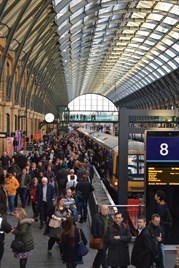 Read the peer reviews for this feature.
Read the peer reviews for this feature.
Download the graphs for this feature.
A well-rehearsed cliché appeared in the opening weeks of 2015, among the comment pages of newspapers and the many websites analysing political opinion ahead of the 2015 General Election.
The election is “too close to call”, the commentators said, although if you strip away the spin, the bias and the hidden agendas, you will invariably find that one party always has the edge.
By mid-February, more published polls from respected polling organisations had Labour marginally ahead of the Conservatives (by just one or two points) than those that had the Conservatives ahead.
Another sizeable chunk of polls measured both major parties as neck and neck. One website even had both parties as set to win exactly 271 seats each, which would mean that without support from smaller parties such as the Liberal Democrats or the Scottish National Party, neither could win an overall majority of 326 seats. That magic number has never looked more difficult to achieve than at any time since at least 1974 - the last year of two General Elections.
By the time this issue of RailReview is in print, such predictions may have changed completely again, with one party surging ahead of the other and increasing its chances of an overall majority.
But regardless of whether or not one party gains a clear advantage, some sort of stable or long-term arrangement will be needed to see the next government through to 2020, under the new regime of fixed-term parliaments.
And whatever the outcome, the rail industry will remain a politicised subject open to much debate. The past five years have shown that more than ever, with high-speed rail becoming increasingly important on the legislative agenda, the go-ahead for Crossrail and the start of major construction work, and a great many other schemes being authorised (many wrapped up in the £38 billion of funding for Control Period 5 and beyond).
The devil is in the detail, however, and the nature of party manifestos means that they aren’t traditionally known for their fully costed, line-by-line plans for various policy areas - certainly not in areas as technical as transport. The headline policies win votes… the detail comes later. Or maybe those headline policies are discreetly shelved or even forgotten.
To better understand what the parties might do for rail beneath the high-level commitments, we must look at their record (an easier task for the Coalition parties), and at a series of speeches, statements and policy positions for the other parties (particularly Labour).
Hopefully for the rail industry, the tap of investment will not be turned off any time soon. Barring a political earthquake, the case for investment in rail as a contributor to economic growth has been made, with the industry enjoying the sort of consensual support that hasn’t been present for many years.
RailReview asked the three main parties five questions relating to what they would do around the structure of the industry - and how they would fund it (see page 11). The responses were mixed, with some parties preferring to focus on their own specific rail promises. At the time of writing, none of the parties had written the final form of their manifesto.
The message from the Conservatives is essentially ‘more of the same’. The party’s spokesman refused to answer RailReview’s questions directly, although of Secretary of State for Transport Patrick McLoughlin did release a statement.
“I am incredibly proud of the Conservative party’s record on rail in this parliament - a time of expansion, investment and ambition. That will continue after the election under a Conservative government,” the minister said.
“Since 2010 Britain’s railways have seen passenger numbers increase by 25% and investment grow to meet that demand. Infrastructure development is at the heart of the Conservatives’ long-term economic plan.
“With government support Network Rail is investing £38bn in our railways on projects that will run through the next parliament, including electrification of key main lines and urban routes. Only the Conservative party can guarantee that this vital investment will continue as part of a costed, affordable plan for government. We will work with industry, including Network Rail, to make sure this investment is carried out effectively and affordably, so that passengers get the benefit.”
McLoughlin restated the promises of high-speed rail that are already being steered through Parliament, as well as investment in railways in the north of England.
“A Conservative government will also raise its ambitions for the future, backing HS2 with a funded plan for the start of construction following Royal Assent, and working with northern cities and businesses to create the infrastructure for a Northern Powerhouse economy, including steps towards a fast trans-Pennine rail link.”
On franchising (an area that had some very difficult moments during this government, most notably in 2012), McLoughlin promises continuation of the new focus on quality, particularly in areas that have been starved of new (or at least more modern) rolling stock.
“A Conservative government would also build on the growing success of the franchising programme to make sure new franchises include investment for growth, including in the North and East Anglia, where franchises let by the last government held back investment. The newly restructured franchise process that demands quality as well as cost assurances would be maintained. We must ensure that Network Rail delivers on its obligations and works closely with operators to deliver long-term improvements on each line.”
McLoughlin continued: “When it comes to Britain’s railways, there is a clear choice at the election. I am confident the competence this Conservative-led government has demonstrated, in being prepared to make the tough decisions needed to deliver better railways and rail services, will be rewarded by continuing growth in the use of trains by people and businesses.”
The Liberal Democrats, according to the first draft of their manifesto document, state: “We need better transport infrastructure, faster broadband, a modern railway system and less congestion on our roads.
“We will set out ten-year rolling capital investment plans, develop a comprehensive plan to electrify all suburban and major rail routes, re-open many smaller stations, restore twin-track lines to major routes, and proceed with HS2 as the first stage of a high speed rail network to Scotland.” (Much of this chimes with pre-existing CP5 plans.)
The party also says it would support a new generation of light rail and ultra-light rail schemes “in towns and cities where local people want them”. It would also support the expansion of smartcard ticketing systems, a previously stated government aim.
The Lib Dems say electrification is all about ‘greening’ the rail network, and that they have an “ambitious plan” for electrification. In terms of capacity, the party says it is committed to HS2 to Leeds and Manchester as the first stage of a high-speed network that will benefit Scotland to ease north-south capacity, as well as looking at feasibility studies for line re-opening elsewhere in the country.
The bigger issue of the deficit also comes into play: “We are committed to paying down the deficit during the next parliament, but have highlighted railways as one area of capital spend where we would be willing to borrow in order to invest once the books are balanced.
“The Tories will continue to shrink the state and investment from an ideological standpoint, even after the deficit has been paid off. Labour’s plans involve paying off the deficit so slowly that it will take longer to balance the books, and general borrowing will duly increase.”
Intriguingly, the issue of Network Rail’s status appears to be a grey area - suggesting a return to the private sector or even a break-up of the organisation.
“We’ll look at the NR issue,” says the party’s spokesman. “However, it may not be in public hands forever, and we have to strike a balance that is fair for everyone.”
The party claims that its influence forced the Conservatives to abandon plans for RPI+3% fare rises, and so has kept prices down. “Reduced flex will keep working for the best deal for rail passengers going forwards,” the party says, no doubt with continued controversy over fare rises in recent years in its mind.
The lack of detail from either the Conservatives or the Liberal Democrats - two parties that are hopeful of being in power either as a majority or as a coalition partner in a post-2015 government - is baffling.
Of all the major parties asked for their positions on the five specific questions put to them by RailReview, only Labour was prepared to respond fully.
Asked about the main issues for the railway in the months and years ahead, Shadow Rail Minister Lilian Greenwood told RailReview: “In the immediate term, the most pressing concern - apart from the rising cost of travel - must be the overspend and overruns on the CP5 enhancement programme that is vital for improving the network’s capacity.
“The cost of Midland Main Line and Great Western electrification alone has doubled, and other projects such as TransPennine electrification have been allocated funding, but the plans themselves have not yet been costed.
“As the Transport Select Committee said in January, all the Government’s plans for 2014-2019 have now been called into question. So one of the immediate priorities for the next Government and the industry must be to get CP5 back on track.”
The next point on which Labour responded was very much on their territory - the proposition was their own in the first place, and a concept advocated by the industry’s leading commentators since the abolition of the Strategic Rail Authority.
Would the creation of a ‘guiding mind’ for the railway - an agency of the government to oversee electrification strategy and renew rolling stock - be beneficial?
“We strongly believe that for all the positive work that is being done in the industry, the railway is still in need of a guiding mind to contract routes and co-ordinate services and skills,” said Greenwood, unsurprisingly.
“The West Coast franchise collapse, the connected job losses in the supply chain, and the TPE rolling stock fiasco were painful reminders of the fragmentation in the industry. That’s why we want a proper long-term plan for procuring rolling stock.
“At a time when fares are rising faster than wages, we believe that the lack of passenger representation is unacceptable. We would ensure that passengers are represented and that, unlike the Government’s Rail Delivery Group, the guiding mind is accountable to both Parliament and the travelling public.”
(For all the supposed synergy between the Liberal Democrats and Labour, a well-placed source at the latter tells RailReview: “This isn’t something we are considering. The Department has a Minister for Rail and rail is a high priority for the Department.”)
The guiding mind (a reborn Strategic Rail Authority - an organisation introduced and then scrapped by the last Labour government) could bring NR together with a new representative passenger rail body to contract routes, co-ordinate services and skills in the industry, oversee stations, fares and ticketing, and ensure customer satisfaction across the network. However, given the cost of both major infrastructure and rolling stock, the question of finance is crucial. What would Labour do?
“Network Rail’s funding is fixed until 2019, and indeed the current Government has set out overall spending plans for rail until 2020/21.
“In the medium to long term, there are substantial efficiency savings that can be made through better planning of major infrastructure projects. We’ve too often seen a ‘stop-start’ approach to investment from successive governments. That’s why, as Ed Balls has announced, we will include legislation to establish an independent National Infrastructure Commission in our first Queen’s Speech.”
Greenwood envisages a commission with a chairman appointed on a cross-party basis, with the organisation able to better identify, plan and deliver the infrastructure that the country needs.
Should the debt on Network Rail’s credit card (the ‘regulatory asset base’) be written off, given that the company is now back on the public books? Or should NR continue to borrow in this way, to fund major projects?
Greenwood says that NR’s borrowing arrangements are now in “unfamiliar territory”, following the organisation’s reclassification and the publication of the Government’s new Framework Agreement with Network Rail, but she is open-minded about other ways of financing improvements to the network.
“It’s up to ministers to prove that the new arrangements are fit for purpose, but I don’t necessarily think that we should discount other ways of funding investment.
“Chiltern Railways has made use of the facility charge model for its Evergreen 3 project, and I am regularly lobbied by colleagues from Hull who wish to see the privately-funded electrification of their connection to the East Coast Main Line.
“As we devolve more powers and funding, transport authorities should be able to concentrate resources much more effectively, and indeed local authorities can often find creative solutions to funding challenges. These are all options that I’d be interested in looking at after the election.”
Greenwood does not deny the oft-repeated point that the Rail Delivery Group often reminds journalists of… that successive government policy has indeed lowered the taxpayer’s burden of paying for the railway over the years, directing it more towards the fare payer.
“We have already said that we will review fares and ticketing structures. We think that the ‘flex’ mechanism has been used to unfairly target commuters, and that’s why we are committed to scrapping it - not just for one year, as the Government has done, but completely. We have also set out other reforms, such as giving passengers a legal right to the cheapest fare.”
Greenwood also recognises that despite the unequal fare payer/taxpayer split, “there’s no doubt that the railways provide a service that benefits the whole country”.
She adds: “Record investment has been made in recent years. From 1997 to 2010, more was invested in the railways, in real terms, than under any previous government. The Government is still supporting the railways by around £4bn a year, and we believe that money could be spent more efficiently to provide a better deal for both fare payers and taxpayers.”
The party’s National Policy Forum has resolved to “ease the pressure on fare payers by capping annual fare rises on every route, simplifying fare structures, and creating a new legal right to the cheapest ticket.”
The NPF resolution recognises that since the late 1990s there has been significant investment in the railways, and that passenger numbers have grown sharply.
“But it is now clear that the rail system is not delivering a fair deal for passengers or the taxpayer, almost 20 years on from the botched privatisation of the railways. Both public subsidy and fares are higher than in other countries and there is no ‘guiding mind’ overseeing the railways, planning investment and ensuing results. We have also seen a chaotic franchising process in recent years that has cost millions.”
It continues to suggest that the situation whereby Directly Operated Railways cannot run franchises should be reversed (this would entail an amendment to the 1993 Railways Act), calling for the lessons of East Coast to be learned.
That could mean DOR or another form of not-for-dividend or public sector operator (perhaps a consortium of local authorities in the guise of a Rail North, for example) being able to “challenge the train operators on a genuinely level playing field in the public interest, to secure value for money for passengers and taxpayers”.
Says Greenwood: “We now have a situation where you can be a European public rail company and run our railways, but our own British-owned operator is unable to run lines in the future. We need a different approach that puts the public interest first, reverses the presumption against the public sector, and properly serves the passenger.”
Unsurprisingly, given the problems over the West Coast competition, Labour has pledged an overall review of the passenger rail franchising process “as a priority”, in order to safeguard taxpayer and passenger interests and put in place a system that is fit for purpose.
Under a Labour government, decisions over devolution (with the administering of rail franchises already devolved to Scotland and soon to Wales) could involve the operation of regional and local bus services, trams and ferries into a single network - much like many other European countries (particularly in Scandinavia). This would mark a significant shift in the way public transport networks overall are run and funded.
More recently, the party has also committed to an infrastructure commission to plan long-term investment, through the implementation of Sir John Armitt’s recommendation for a National Infrastructure Commission.
Passenger rail franchising survived a potentially fatal blow in 2012. But with the Inter City East Coast franchise let to Virgin/Stagecoach and a forthcoming deal for Great Western, there is a settled will (even from Labour, for the time being) that franchising will continue at least in some form.
Projects such as HS2, Crossrail and other improvements to the network (some of which have required cross-party support for Bills) are already either under way or are at least making good progress at the legislative or planning stages - proving across Labour, the Liberal Democrats and the Conservatives that there is a great deal of both funding and political commitment to the railway.
And although the Coalition parties don’t want to answer the difficult questions on railway finance (the taxpayer/farepayer split, or what to do about NR’s credit card), there is at least an acceptance that the railway is a good thing for the economy, even if the sums of money involved are large.
Benefits of major features become apparent years into the future. If today’s generation of politicians is confident of the benefits to the economy of something that may not open until 2019, 2026, or even 2033, it is a vote of confidence that the railways can be trusted to deliver and provide essential transport infrastructure for the future.
A speech given by McLoughlin at an event held by the Campaign for Better Transport in February hinted that there would be no substantial shifts in rail policy, from a Conservative point of view.
But having placed considerable emphasis on rail in the past five years, a 2015-2020 Conservative-led government might well choose to shift any spare energies and efforts towards aviation policy, and in particular the vexed question of South East runway capacity.
And while the planning process for Control Period 6 (2019-2024) is already under way, immediate questions of railway funding may not immediately concern political parties keen to address more electorally palatable issues such as health, education, the European Union and immigration).
There is a clear political appetite to keep rail fares down - particularly season tickets. But much of the pressure is on the South East, and commuters there already enjoy heavily discounted single journeys. If fares are to be capped, what will pay for new trains to replace the hated Pacers and other types of 1980s DMUs in the North of England?
Which future government will promise a massive increase in passenger subsidy to bring the 75%-25% farepayer/taxpayer split once more favoured towards the taxpayer? The answers given by all major parties inevitably generate more questions.
 Peer review: Steve Norris
Peer review: Steve Norris
Minister for Transport 1992–96.
Commissioner, The Independent
Transport Commission
|
It is not surprising that so close to the election none of the political parties want to disclose their manifesto on an issue which, however important it is to us in the industry, does not actually alter voters’ minds as much as we think it should. |
One of the lessons you learn as a Minister for Transport is that while everyone grumbles about fare increases, crowded carriages with standing room only, overflowing ‘loos’ and curled-up sandwiches, they don’t associate any of this with one particular party. They think we’re all as bad as each other, and in my experience over the past quarter of a century they’re probably right!
So what to make of all these promises? They are all largely ‘mom and apple pie’. We all think rail is a good thing and the three major parties support HS2 and in all likelihood will support HS3. Control Period 5 is unlikely to be tampered with, although the next government will need to look closely at how well Network Rail is spending the billions in its stewardship.
One of the counter-intuitive features of this Parliament has been NR’s virtual renationalisation under a Conservative-led coalition. The challenge for the next Secretary of State will be to translate that formal status into better accountability to taxpayers and passengers alike.
Lack of accountability has been a key reason for Network Rail’s poor performance over the past decade.
The Member governance model has been largely ridiculed in the industry for its lack of effectiveness. Now we know who is in charge and that person needs to engage with Richard Parry-Jones and Mark Carne quickly and forcefully. The two major parties are both aware of this and whoever leads the next administration, their approach is likely to be very similar.
The same cannot be said of their approach to franchising. The Conservatives have not handled this well. They came to office preaching (correctly) the virtues of longer franchises as the way to generate private investment in stations and other infrastructure. In the event, they became the creatures of DfT civil servants who argued that long franchises would mean the Department would lose control – to which the correct response should have been “precisely”.
Sadly, that was not what they heard. Short franchises turn operators into little more than ticket collectors and there is no evidence yet that this fundamental lesson has been learned by either the Tories or Lib Dems. That said, the Tories do believe the record growth in ridership since privatisation is proof that the current model has worked.
Labour cites East Coast as an argument for renationalising operators and re-creating government-owned regional railways. The mathematics do not support their assertion, but the debate identifies the key battleground. If you believe that the state runs services well, you back Labour. If you believe the state is demonstrably hopeless at running services and that the private sector does the job much better, you support the Conservatives. The Lib Dems will go with whichever party rescues them from oblivion.
So what’s missing? It was recently disclosed that passengers are now paying a bigger share than ever before of the cost of the railways. So while the deficit is reducing, the cost is being borne increasingly by individual travellers.
Is this right? Should we look to a continental model that recognises the non-user benefit of public transport? None of the parties is keen to address this, but it is probably the most important issue confronting the industry.
Are current commuter fares seriously value for money or is there an element of ransom? It would be good to hear the parties discussing this thorny issue - but I fear we shall be disappointed.
 Peer review: Richard Bowker
Peer review: Richard Bowker
Former chairman, Strategic Rail Authority
Politics and railways… two words that have always appeared bound together. The main parties seem to have divergent views on pretty much everything (though not, it appears, on HS2).
Peculiarly, the main parties also seem to alternate their positions on a periodic basis. In 2004, Labour decided the industry no longer needed a guiding mind, saying it was sufficient (indeed essential) for ministers to have overall control of strategy, notwithstanding that they already had such powers enshrined in Law by way of the Transport Act 2000. Now, it is the Conservatives who believe the current status quo should be maintained and Labour who is promoting the latest incarnation of a guiding mind.
Railways are genuinely political and the current narrative we are offered is thus: all railways make sense, they offer a route to redemption from our sinful past of over-reliance on the car and we should make them cheaper and more affordable.
However, there is a flaw in this - not every railway makes sense. Railways are efficient at certain things, such as: (1) high-speed, high-capacity long-distance services; (2) high-speed homogenised or containerised freight; (3) high-density, high-capacity urban and commuter services, where the demand justifies it. Beyond those relatively obvious parameters, the case becomes harder to make. Just because a train is full does not mean it makes economic sense, especially when the alternatives are properly considered.
So which of the parties have got it mostly right this time? Well, now that the Government has worked out that HS2 is a capacity scheme with the capability to transform our regional economies, and not a high-speed vanity project, most seem to agree that it is the right thing to do. Crossrail 2 also falls into the ‘pretty smart’ category. Together with Crossrail 1, they will comprise a high-density, high-capacity urban distribution network for which the demand is there both now and in the future.
Other projects are harder to justify - for instance, electrifying everything that moves? Not necessarily, especially in the absence of a genuine UK energy policy and when Network Rail seems incapable of working out how much it will cost. Railways only ‘green the economy’ if the full carbon chain stacks up and until we sort out our power generation strategy, that is questionable.
And as for making trains more affordable (lowering fares), when will politicians be honest with voters and explain that if the farepayer doesn’t meet the cost, the taxpayer has to? There are only those two sources of funding - always have been, always will be! Anyway, political grandstanding over cheaper fares willfully ignores just how well the train operators have done with yield management. Many fares are exceptionally good value, even cheap! We all gladly accept the model on airlines, so why not the railways?
The one genuinely exciting political development of more recent times is devolution. Giving regional assemblies the power (indeed obligation) to make local decisions on how to allocate funds is long overdue. For too long, the PTEs and Local Authorities have been able to blame a failure to invest in railways on Whitehall. Yet Manchester has shown that when decision-making powers are devolved, good decisions are made. So, let’s have more of it! Who knows, it may even mean that Regional Assemblies choose to invest in a whole host of non-railway assets and projects (life sciences, R&D, renewables, education, housing), and disinvest in railway lines, stations and services that perhaps make no real sense at all beyond politics.
Railways have been a decent success story over the past 20 years. But they still consume too much resource in terms of operating costs, they still suffer from constant Whitehall micro-management, and too many people still peddle the myth that absolutely all railways make sense. Instead, we need less central control, with whoever has the genuine relationship with the consumer (and that should never be Network Rail) in the driving seat.
The true guiding mind of the railway should be the end user. Overlay that with genuinely devolved powers for local politicians to make local decisions as part of a local strategy and we have a start. But reinvent a kind of SRA (Labour)? Keep the status quo (Conservative)? Electrify everything and make fares cheaper (Lib Dem)? No thanks - they are all recipes for just avoiding the difficult choices that it’s high time we should be forced to make.
 Peer review: Terence Watson
Peer review: Terence Watson
UK Country President and Transport
Managing Director - UK & Ireland, Alstom.
Rail Supply Group Co-chairman
Hang around politicians long enough, and one of them will eventually tell you that we are now in a ‘golden age of rail’. It’s hard to dispute that - the investment, commitment and momentum to rebuild Britain on the back of its railways has never been greater.
But we have to be wary of complacency. While it’s tempting to believe that “It doesn’t appear that the tap of investment will be turned off any time soon”, we must not forget that come the summer we will have a spending review and a new phase of austerity drives.
In fact, with the Treasury challenging government departments to come up with budgets that offer up to 40% cuts, it’s hard to see how Transport will emerge unscathed, especially as budgets for Education, Defence and Health Care are effectively ring-fenced.
The money men should be warned. Rail is no longer just about moving people and freight, but about moving Britain’s economy forward. We therefore applaud the fact that it is at the heart of all parties’ plans for economic recovery. Indeed, the railway is increasingly being recognised as a key industry for Britain’s strategic economic growth - and the creation of the Rail Supply Group is testament to that.
The Rail Supply Group, working with other bodies such as RIA, the RDG, the RFG, as well as government departments BIS and DfT, are working together to help the whole industry deliver a cohesive approach to this massive challenge. It will help us to develop the local supply chain to support growth.
The opportunities are clear. Increased political focus on the railways in recent years has brought many benefits. Without political will, we wouldn’t have seen such great commitment to Crossrail, or the expansion of the London Underground. And while HS2 still has a few more barriers to overcome, it is still Britain’s “Biggest Idea” on transport policy.
But with political support comes greater risk, and that is something Britain’s supply chain cannot afford. The domestic boom and bust cycle won’t let British entrepreneurs do what they do best - export to other markets, then grow, then provide jobs and skills.
This isn’t just of importance for the railways - it will be impossible for the Government to meet its National Infrastructure Plan if it doesn’t deliver on rail. So regardless of the party or their policy, I would like to make the following recommendations:
Firstly, please don’t change things for change’s sake. We need stability. We cannot survive if investment profiles are volatile.
Secondly, the pace of investment on the ground needs to speed up. We’re losing ground with competitors overseas and failing to support our supply chain as a result. So far, only around a fifth of the projects in the National Infrastructure Plan have shovels in the ground.
Finally - while all parties agree rail is a strategic industry, the policy framework around it is still too weak. The rail supply chain can deliver jobs, skills, investment, exports and more. But we can only do it if there is a clear pipeline of projects on a stable timeline, with supportive policies for R&D, apprenticeships and a clear export strategy.
The post-election 2015 spending review will be a nail-biting moment for many in the rail industry, and whispers of nationalisation in response to the occasional failure of the railway to meet expectations will give the rail community’s columnists plenty to speculate about. But the industry and the public will not judge politicians on soundbites, glossy manifestos and headlines. There is only one metric that matters: delivery. While the UK is top of the league for innovative policy thinking, we remain towards the bottom of league for delivery. That’s why, despite being the fifth largest economy we are 27th in the world for quality of infrastructure.
One of the greatest challenges for the next Government is to break that pattern. To misquote Tony Blair, the next Prime Minister should have three priorities: delivery, delivery, delivery.
So despite the fact that the British railway system sometimes fails us, it is important that we keep up the momentum. The massive passenger growth that we see today proves that rail is still the best way to move about the country, nearly 200 years after its invention.
There might be further to go, but we need a stable policy environment to get there. Then we will have a truly sustainable golden age of rail.
 Peer review: Chris Bolt
Peer review: Chris Bolt
Former Rail Regulator and LU PPP Arbiter
Is rail investment really protected? There is general agreement that poor infrastructure can hinder economic growth. And there are undoubtedly pinch points on the railway network, where investment to increase capacity and to improve performance would pass the standard cost-benefit tests.
But this does not necessarily mean that investment in rail is the best use of the nation’s scarce resources. To take an obvious example, there is no point in investing in electrification schemes on the railway if electricity generation, or the electricity network, cannot meet the consequent demands.
And there are real concerns about energy security. Ensuring adequate supplies of energy for business and households, at the same time as meeting international commitments on carbon emissions, will require massive investment in energy networks and production.
All parties recognise that public expenditure cannot be open-ended. There is also an issue with affordability for consumers: higher energy prices (likely to be reinforced when oil prices start rising again) higher water charges (particularly for those served by Thames Water to reflect the costs of the Thames Tideway project), and higher telecom prices (to meet the cost of superfast broadband) all add to the pressure to contain tax-funded expenditure.
So it is surprising that only the Labour Party response to the questions about post-election policy for rail recognises that rail investment decisions need to be taken in the context of broader infrastructure policy. And it is ironic that it is a former chief executive of Network Rail, John Armitt, who has led work for the Labour Party in this area. His proposed Infrastructure Commission will force individual spending Departments to take account of overall needs and affordability in their planning. This can only add to the pressure on rail investment in the next five-year Control Period.
Indeed, any Chancellor is likely to turn the spotlight on rail investment and it’s not as if the sector has a particularly good story to tell - complaints about lack of investment in the last years of a franchise; delays and rising costs on major projects such as Great Western electrification and IEP; and a repeat of the ‘Christmas overrun’ problems (did NR learn nothing from the humiliating fiasco at Rugby in 2007?).
Unless these problems can be tackled quickly and effectively, there is a real risk that any future Chancellor will lose patience with the rail sector. But just as East Coast is returned to the private sector, increased control by DfT over Network Rail will (if anything) make this more difficult to achieve.
Many would agree that the IEP saga shows why Government departments should not be in control of procurement, or even have a significant influence on it. It would be another irony if the restructuring of the Highways Agency, with ORR as its ‘efficiency monitor’, made road investment look even better value compared with rail.
History is littered with broken pre-election promises. Will the protection of rail investment be one of them in 2015?
 Peer review: Nigel Harris
Peer review: Nigel Harris
Managing Editor & Events Director,
RAIL and RailReview
As Managing Editor of RAIL I’ve covered four General Elections (1997, 2001, 2005, 2010), and in none of them was railways a key issue. In terms of both general strategy and hand-to-hand battle tactics, I expect the same to apply in 2015 - but that won’t stop a lot of noise. Indeed, it is already well under way, with Shadow Transport Secretary Michael Dugher firing the first shots.
His comments about the franchise system being destined for “the bin”, with work on scrapping the system beginning within ten days of a Labour majority, are headline-catching. But in my opinion, they are flash-bang distraction grenades, rather than real political artillery shells.
As Paul Prentice so accurately points out, whatever headline policies are peddled before the ballot, they are often later “discreetly shelved or even forgotten”. Given that scrapping franchising would have a very high cost, there’s no way the Treasury would sanction such a plan, in my view.
The same applies to the superficially appealing but actually barmy notion of a public sector bidder such as Directly Operated Railways - any genuinely independent bid would cost the taxpayer around £5 million every time the dice was thrown. And even if the Treasury did nod Dugher’s plans through, the notion that Shadow Chancellor Ed Balls has given Dugher an open cheque for his plans is fanciful to say the least. At least £50m would be needed just to enable a genuinely independent public sector bid for the eight franchises due to be renewed in the next 18 months.
Labour has a very long tradition of dangling imaginary carrots before the electorate. Exactly 19 years ago, in RAIL 272, I interviewed Shadow Transport Secretary Clare Short, who echoed Labour leader Tony Blair’s commitment to a “publicly owned, publicly accountable railway”. Having won the 1997 election with a big majority, Labour quietly abandoned its promise and spent the next 13 years in power seeking to enhance and improve a privatisation that its Transport politicans still described as “botched”.
Labour is not alone, of course, in flipping in search of votes. Flavour-of-the-month UKIP, and its darling of the headline writers, leader Nigel Farage, committed vociferously to not merely High Speed 2 but an entire 300kph network in 2010. UKIP now opposes HS2 and even Farage describes his own 2010 manifesto as “drivel”.
The Conservatives are also at it. Having single-mindedly pursued austerity in the context of endless demands for efficiency, value for money and innovative thinking, Rail Minister Claire Perry recently said that she will not countenance “London’s cast- offs” in replacing Northern Pacers. Vivarail’s completely re-engineered and refurbished D-trains are thereby rubbished at a stroke, when they not only answer all the Government’s stated demands, but also deliver what the McNulty Review required.
More annoying to voters than what they see as crass hypocrisy, is that they are regarded as being too dim to see through this political grandstanding. But even more corrosive in terms of the costs of the railway, investors, bankers and other supporters grow cautious and wary of the increased risk. That risk is priced into the cost of developing our railways - and taxpayers end up paying.

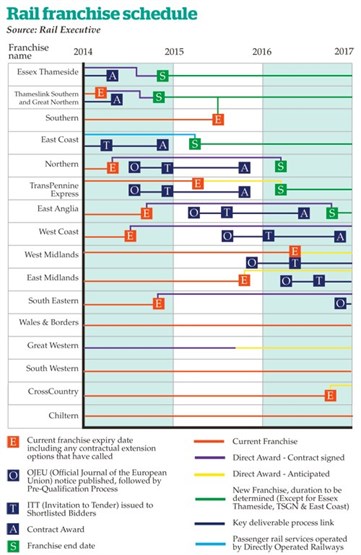
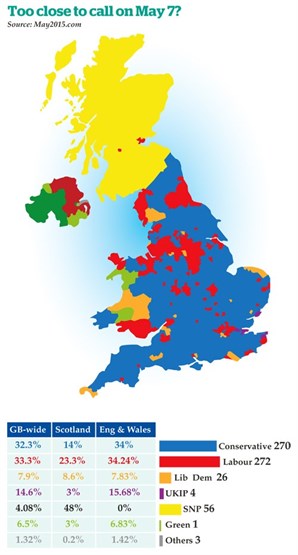
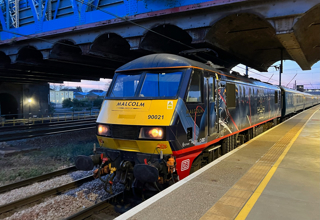
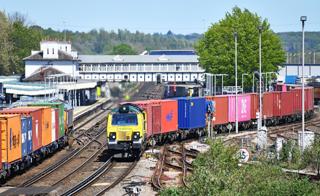
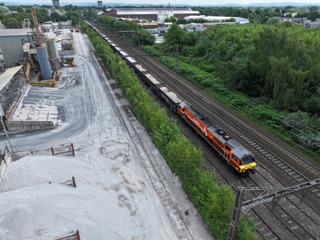
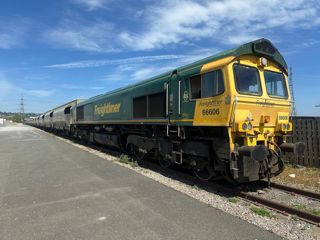
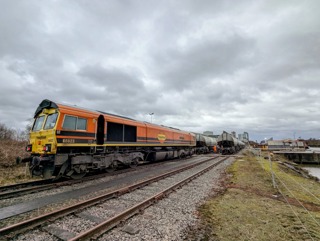










Login to comment
Comments
No comments have been made yet.